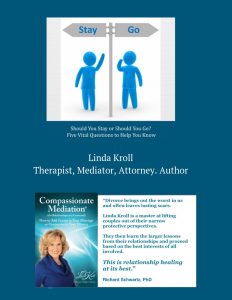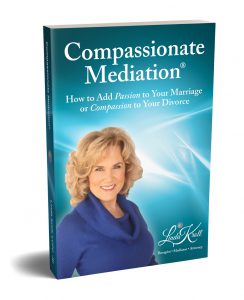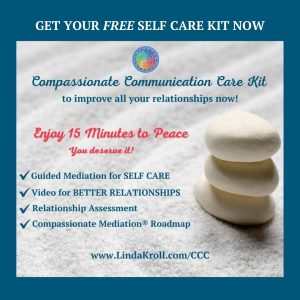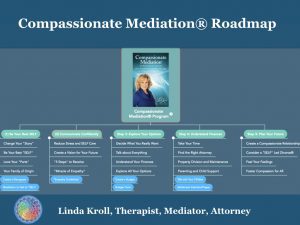 “Should I Stay or Should I Go?”
“Should I Stay or Should I Go?”
How many times have you asked yourself this question—over how many days, weeks, months, years, even decades? Do you feel like your relationship is difficult and don’t know how to change it? Have you had marriage counseling that didn’t work? Are you too “checked out” to try again?
Have you ever considered the possibility of divorce, but were not sure what to do next? Are you too scared to even discuss it? Maybe you’re reluctant to talk with an attorney because that would make the situation “real.” Or perhaps you’ve threatened to leave the union for so long now that your partner doesn’t believe you anymore.
Right now, you may be suffering in silence or engaged in all-out battle. Or you might be separated from your partner and each trying to live your own lives without a clear sense of direction for your relationship. But it doesn’t have to stay that way.
When a marriage is in crisis, you suffer from unmet expectations, dashed hopes, stored resentments, quiet desperation or even overt war. You may have created an “impenetrable wall” around your heart as a way to “manage your pain” and protect yourself from more hurt and disappointment. You may have erected “filters” through which you see your partner, clouded with judgment or blame for what she/he did or didn’t do. (“She always does this, he never does that.”)
If you feel you’ve reached the end of your rope—that you can’t go on this way any longer, that you’re at a crossroads and don’t know which way to turn next—before you take a step in any direction, it’s time to come home to your SELF.
Vital Question #1: Am I bringing my best SELF to the relationship?
When you are “in SELF,” answers to your questions will come to you with ease. You won’t have to agonize about which direction to pursue. You will be led by that inner wisdom which is always available when you quiet your mind enough to hear it.
Many terms are used to describe our most centered, compassionate, and spiritual nature: for example, true self, inner wisdom, higher self, Soul, Spirit, Universe, Oneness, source energy, Buddha nature, Brahman, Inner Wise Self, Inner Wisdom, Inner Pilot Light, higher consciousness, etc. Regardless of your belief systems, and in the interest of laying common ground and language between us, I will call this best, most loving, wisest part of us—the SELF (all capital letters).
Whenever you operate from SELF, you’re calmer, clearer, and more compassionate. You speak with greater confidence and courage, as you stay connected to your deep, inner knowing. You’re no longer making decisions from old, reactive “Parts” of you that are scared, walled up, judgmental, angry, or retaliatory. You’re able to stay in the present moment and co-create a relationship that considers everyone’s needs, starting with your own.
You may hear different voices in your head. You may have different Parts with different feelings and needs. Sometimes you think, “I want to leave, but I’m afraid.” Other times you may feel, “I hope he/she will change and give me what I need.” You may act “angry” one minute or “withdrawn and distant the next moment.“ There may be a Part of you who wants to stay and another Part that wants to run away.” Guilty, resentful, terrified, hopeful. You have many Parts. Whenever you’re “in SELF” you can speak for your Parts instead of from your Parts. Then you communicate with honesty, empathy, and clarity.
Unfortunately, most of us find it difficult to operate consistently in SELF-mode. More often, we’ve learned how to relate from our “Parts.” The way back to “SELF” is to first know, understand, and love our Parts. Compassionate Communication allows you to connect to your best SELF, let go of limiting beliefs, unburden pain from the past, and relate from your heart.
Vital Question #2: Am I Showing Empathy to My Partner (and to My SELF?)
You first said, “I do,” with the thought of staying married forever, and now you and your partner have developed some bad habits in your method of communication. Many individuals are afraid to share their honest feelings and unmet needs with their partner, so they suffer in silence, act out in rage, or secretly disconnect and find another partner with whom to have an affair.
Problems in relationships are rarely about what you are saying, but how you are saying it. Parts often carry a negative energy or tone. Whenever you speak from SELF, you create more acceptance, attention, appreciation, and affection for each other.
When you are “in SELF,” you are practicing “witnessing awareness” of the behaviors of your Parts and your partner’s Parts. You can notice what is happening between you and then make conscious choices to respond in ways that foster better communication.
It’s important that you and your partner each do your own work, but if only one of you is willing, the dynamics of your relationship can still change. When SELF is present (even if it just comes from you), the relationship improves immediately. You will understand your own unique Parts in order to heal the past and connect to your spiritual source—whatever that means to you. The more you practice showing empathy — acceptance, forgiveness, humility, responsibility, compassion, and non-judgment — the more liberating life becomes—not only for yourself, but everyone around you.
Vital Question #3: Have You Explored All Your Options?
You may feel stuck in you present situation because you feel your only options are the status quo or divorce. You may not be ready or willing to terminate your marriage for many reasons:
- You hope your partner will change
- You dread being alone
- You’re worried about your children
- You’re anxious about your financial future
- You are guilty about breaking up your family
- You still love your spouse
You don’t have to leave, but you don’t have to stay in the relationship you have now. You can learn how to create a new marriage together, even if you are the only one willing to do the work! However, you may have to be strong enough to be willing to leave at some point in the future, rather than stay unhappy, resentful, unfulfilled, unfaithful, and/or helpless and hopeless.
As you do your own work, you will take the time you need to become fully informed of all of the possible options available to you, including:
- Individual counseling
- Couples counseling
- Group counseling (12 step meetings can be invaluable)
- Post-nuptial agreement (like a “Pre-nuptial Agreement” only after you are married).
- Separation (discussions needed but no legal action required)
- Legal Separation
- Compassionate Mediation® to create a new and improve relationship
- SELF-Led Divorce®
In the past, divorce has created turmoil, pain, financial disaster and broken families. It doesn’t need to be that way. With Compassionate Mediation® healing can happen—and new, healthy relationships are possible..
Vital Question #4: Do You Understand Your Finances and Your Rights
Are you afraid that if you ask for or make some changes that you will be financially destroyed? Is your partner threatening you in ways to keep you from making your own decisions? Have you taken the time to learn what you own and what you owe? Will you give yourself the right amount of self-care and self love to get the information and support you need?
Many couples begin a conversation about divorce with little or no prior discussion of issues that one or both of them may have ignored or taken for granted. Perhaps you are more responsible for paying bills than your spouse, and you wish that your partner were more pro-active and involved. You may not share equal knowledge of what you both currently earn, spend and save. You may have never discussed retirement plans, savings for your children’s college costs, or how discretionary income can be spent.
All of these topics are on the table when divorce is planned, but it is also paramount that they be part of a healthy relationship in which both parties are equal and informed partners. In many situations, each member of the couple has taken on the same roles of their parents, and then come to resent the fact that the other spouse doesn’t earn more, parent more or pay more attention to the financial and parental details in their lives.
When intimacy is an issue, as it often is, it’s due to the resentments, judgments, and blame that create walls and filters that have inhibited or blocked their sex lives. Couples can live separately and separated under the same roof for years, and even decades. If they took the time to heal the pain, forgive, and be grateful for what they do share, they could renew the bond that brought them together years before.
Learning how to talk compassionately about all subjects creates a sense of safety and trust that probably has been missing for a long time. You can make the time for all these conversations and give you and your spouse, and your family, an opportunity for an intimate and compassionate new beginning.
Vital Question #5: If You Had a Magic Wand, Would You Add Passion to Your Marriage or Compassion to Your Divorce?
Your answer helps you set your personal intention for your relationship right now. Are you hoping your spouse will change to meet your needs? Are you reacting to his indifference thinking a divorce would set you free? Have you become attracted to someone else and want to explore single life? Do one or both of you secretly hope for a reconciliation? If so, you can build on that hope.
Your answer will help you get an idea of what you each want: a new and better relationship together, a separation, or a divorce. How much do you each know about separation or divorce? Have you or your spouse already spoken with an attorney? Are your expectations realistic? Have you thought about what you want to do about staying in your house, dividing assets, discussing maintenance, childcare and parenting?
Often one or both of you may be resigned to the decision of the other, not realizing you have other options to be considered. If you learn Compassionate Communication, you can discuss all your long-standing issues with mutual respect and confidence. Your new skills of listening with empathy and asking for what you want and need help create a fertile ground for building something new.
Even if a third party is now involved in an emotional or physical affair, you can still heal from that betrayal and move forward with optimism and possibility. However, if there is adultery, abuse, or addiction without a desire to stop or change the behavior, then divorce will be the most likely outcome.
However, if there are hurt feelings that have never been acknowledged or healed, there is a chance that communications training can finally enable you and your spouse to feel seen, heard, and acknowledged. You can learn how to talk about your desires, unmet needs and expectations, hopes and dreams.
Compassionate Mediation® Will Lead You to Your Answer
If couples put as much energy into learning how to communicate with compassion as they have to put into getting a divorce, profound changes can occur within them and between them.
The French philosopher Teilhard de Chardin said, “We are not human beings having a spiritual experience. We are spiritual beings having a human experience.” You can always tune in to who you truly are, underneath your thoughts, feelings, and past experiences. You can connect with what is your divine spiritual nature in the midst of your human experiences. You become more conscious, aware, mindful—in other words, more “SELF-led.” You learn how to choose your responses, your behavior, and your future decisions from your highest and best SELF. Becoming more conscious and SELF-led in your relationship allows you to focus on the higher good for all concerned, and then relate compassionately to heal and transform the dynamics between you and your partner.
Compassionate Mediation® offers the tools of Compassionate Communication, the Miracle of Empathy, and all the information you need to create a new and improved situation, no matter the form. You can heal and transform your relationship for the highest good of all concerned. You can take the time you need to acquire all the skills, information and support to help you decide what to do next. You will feel more balanced, peaceful, openhearted, open-minded, and present. When you take the time to become more SELF-led, you can choose to consciously create a new relationship that leads to more intimacy, passion, connection and fun.
You will bring your best SELF and have the relationship you desire and deserve.
To learn more, please visit https://lindakroll.com/ and get your free chapter of Compassionate Mediation® for Relationships at a Crossroad: How to Add Passion to Your Marriage or Compassion to Your Divorce.


